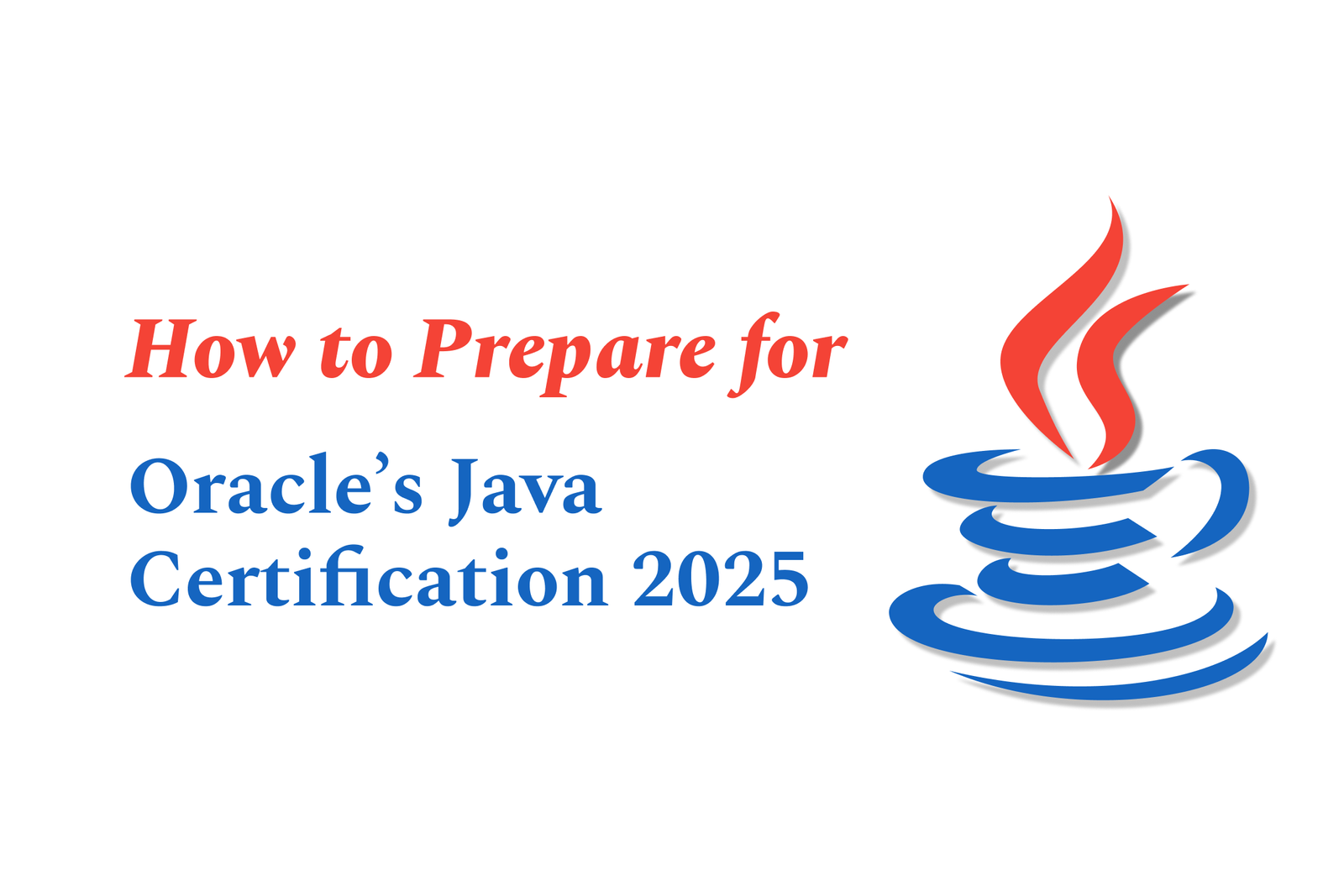How To Prepare For Oracle?S Java Certification 2025
Oracle's Java Certification 2025 validates your Java skills, enhancing career prospects. To prepare, study the latest exam topics using official Oracle materials, practice with mock tests, engage in coding projects, join community forums, and maintain a consistent study schedule for success.
How to Prepare for Oracle's Java Certification 2025
1 ) Understand the Value of Oracle Java Certification
Oracle Java Certification is a globally recognized credential that validates your Java programming skills.
It enhances your job prospects and demonstrates proficiency to employers, especially valuable if seeking roles related to Oracle technologies.
2 ) Identify the Certification Path and Exam Objectives
Research the specific Java certification relevant for 2025, such as Oracle Certified Professional: Java SE.
Review the latest exam syllabus and objectives on Oracle’s official website to understand topics tested, including Java fundamentals, object oriented programming, Java APIs, and new language features.
3 ) Utilize Official Oracle Training Resources
Enroll in Oracle University courses or guided learning paths tailored for Java certification.
Participate in hands on labs and real world scenario exercises to deepen your practical knowledge.
4 ) Take Advantage of Free and Discounted Resources
Leverage free certifications and study materials currently offered by Oracle, such as those in cloud infrastructure, AI, and multicloud services, that complement Java learning.
Watch for promotions like the “Race to Certification 2025” program providing rewards and learning incentives.
5 ) Practice with Sample Exams and Mock Tests
Access sample questions and mock tests to familiarize yourself with exam format and timing.
Identify weak areas and review related Java concepts thoroughly.
6 ) Join Community Discussions and Forums
Engage with communities (such as Oracle forums and r/oracle on Reddit) to share insights, ask questions, and learn from peers' experiences.
Stay updated on any certification changes or tips from recent exam takers.
7 ) Plan Your Study Schedule and Stay Consistent
Draft a realistic study plan that covers all topics well in advance.
Allocate regular time blocks for study sessions, practical coding, and revision.
8 ) Apply Your Knowledge Through Projects
Build small Java projects or contribute to open source applications to apply concepts practically.
Hands on experience strengthens understanding and retention of Java programming skills.
9 ) Register for the Certification Exam and Prepare Logistically
Schedule your Oracle Java certification exam through official channels once confident.
Ensure identification, exam environment, and technical requirements are prepared to avoid last minute issues.
Preparing effectively by combining Oracle’s official resources, consistent practice, community engagement, and applied learning will significantly improve your chances of success in earning the Oracle Java Certification 2025.
https://justacademy.in/news-detail/how-android-is-handling-app-permissions-in-2025
https://justacademy.in/news-detail/android-system-resource-management
https://justacademy.in/news-detail/the-rise-of-react-native-in-augmented-reality-apps
https://justacademy.in/news-detail/ios-simulator-gets-major-updates-in-xcode-16
https://justacademy.in/news-detail/android-update-rollout-delays-and-reasons
Related Posts
In 2025, top Angular libraries offer modern, feature-rich components and tools for building dynamic web apps. From powerful data grids to low-code platforms like UI Bakery, these libraries enhance development speed, UI design, and scalability, making them essential for Angular developers.
Migrating from AngularJS to Angular 17 involves gradually upgrading your app by running both frameworks together using tools like ngUpgrade, rewriting components in TypeScript, and adopting Angular’s modern architecture to enhance performance, maintainability, and long-term support.
Angular state management tools help organize and handle app data efficiently, improving scalability and maintainability. Popular options include NgRx for robust, RxJS-based patterns, and newer Signal Store solutions that offer simpler, reactive approaches integrated tightly with Angular’s latest features.
RxJS in Angular empowers developers to manage asynchronous data streams with powerful operators like `forkJoin`, `combineLatest`, and `zip`. Mastering these key operators in 2025 is essential for building efficient, reactive applications that handle complex event sequences seamlessly.
Angular performance optimization in 2025 focuses on improving app speed and responsiveness by using techniques like OnPush change detection, lazy loading, efficient data caching, and AOT compilation. These practices reduce load times, enhance user experience, and ensure scalable, fast Angular applications.
In 2025, Angular remains preferred for large-scale, enterprise apps with its robust, all-in-one framework, while Vue attracts developers seeking simplicity and fast development for smaller projects. Both frameworks excel, with choice driven by project needs and team expertise.
Angular Signals are a new reactive primitive in Angular 16 that enable fine-grained, efficient change detection by automatically tracking dependencies and updating only affected parts of the UI. They simplify state management and boost app performance, revolutionizing Angular's reactivity model.
Angular interview questions to prepare in 2025 focus on core concepts like components, directives, data binding, routing, and dependency injection, along with TypeScript mastery and latest Angular features to ensure strong practical knowledge for building scalable, efficient web applications.
AngularJS reached its official end of support in January 2022, meaning no further updates or security patches. To ensure app security and performance, developers should consider migrating to modern Angular versions or seek third-party long-term support options if immediate migration isn’t possible.
The Angular Roadmap 2025 highlights upcoming features focused on improving developer experience and performance, including zoneless Angular, Signals integration, enhanced Forms, async data handling, improved HMR, and expanded Angular Material/CDK enhancements, driving modern, efficient web app development.










